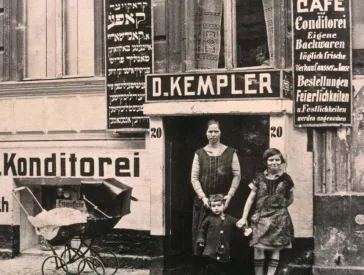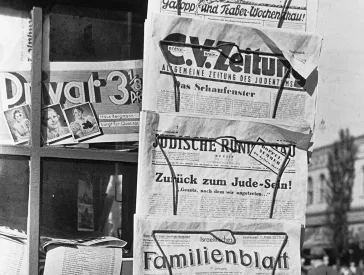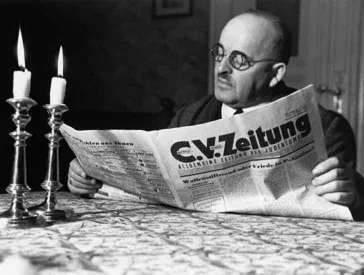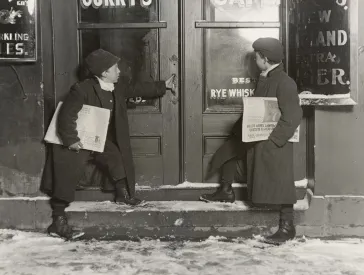Special Exhibitions and Cultural Events in September and October 2010
Press Information
Press Release, Wed 28 Jul 2010
Fall begins at the Jewish Museum Berlin with a large special exhibition opening on 27 September. "Forced Labor. The Germans, the Forced Laborers, and the War" provides the first comprehensive presentation of the history of forced labor and its ramifications after 1945. The program surrounding the special exhibition includes bus tours to the places of forced labor in Berlin and a panel discussion on "Forced Labor in Europe – Forced Labor in Berlin."
"You’ve come to a family of perfumers!" were the words that greeted the new-born offspring of the Berlin-based cosmetics firm Scherk in 1918. Those words of welcome have become the title of the cabinet exhibition that will tell the story of the Jewish family business Scherk und Albersheim from 2 September.
On 30 September, Museum director W. Michael Blumenthal will present his memoirs. "Around the World in 80 Years. My Life" (Propyläen Publishing House) is a personal record that unfurls a panorama of the 20th century. The book launch celebration will be moderated by CICERO chief editor Michael Naumann and will begin a series of readings that will take the author back to his place of birth, Oranienburg.
- Contact
-
Press office
T +49 (0)30 259 93 419
presse@jmberlin.de
- Address
Jewish Museum Berlin Foundation
Lindenstraße 9–14
10969 Berlin
Special Exhibitions
Forced Labor.
The Germans, the Forced Laborers, and the War
In Germany during World War II, forced laborers were exploited on nearly every building site and farm, in every industrial enterprise, and even in private households. Over 20 million men, women, and children were taken to Germany and the occupied territories from all over Europe as "foreign workers," prisoners of war, and concentration camp inmates to perform forced labor.
The exhibition "Forced Labor. The Germans, the Forced Laborers, and the War" provides the first comprehensive presentation of the history of forced labor and its ramifications after 1945. The historical exhibits and photographs allow insight into the relationship – defined by racism – between Germans and forced laborers, with all the scope that people found within this framework. They also show how forced labor was part of the Nazi regime’s racist social order from the outset: The propagated "Volksgemeinschaft" (people’s community) and forced labor for the excluded belonged together.
An exhibition by the Buchenwald and Mittelbau-Dora Memorials Foundation at the Jewish Museum Berlin, initiated and sponsored by the Foundation "Remembrance, Responsibility and Future"
When: 28 September 2010 to 30 January 2011
Where: Old Building, first level
Admission: 4 €, reduced rate 2 euros
Jewish Life in Argentina
Contributions to the 200th Anniversary
The Argentine Jews today – 200 years after the founding of the state – are an inextricable part of Argentina’s pluralistic and democratic society. Their contribution to the country’s development and growth is the focus of the exhibition at the Jewish Museum Berlin. The guiding theme of the exhibition’s four installations in terms of both content and design is the book as a symbol for the Jewish contribution to Argentine intellectual life. The heart of the exhibition is the "Bookstore of Memories": Through a selection of biographies of Argentine personalities, it tells the story of a country which sees the cultural and ethnic diversity of its inhabitants as the cornerstone of its identity.
An exhibition by the "Organizing Committee for Argentina's Participation as Guest of Honor at the 2010 Frankfurt Book Fair" (Argentine Ministry of Foreign Affairs) and the Embassy of Argentina in Germany.
When: 23 July to 10 October 2010
Where: Libeskind Building, ground floor, Eric F. Ross Gallery
Admission: with the Museum ticket (5 €, reduced rate 2.50 euros)
Cabinet Exhibition
"You’ve come to a Family of Perfumers!"
... is how Fritz Scherk (1918-1995) was greeted by his family at his birth. He grew up amidst perfume and powder compacts. The Albersheims, who had owned a perfumery in Frankfurt since 1892, were part of the family as was his father Ludwig, under whose hand the Scherk cosmetic company in Berlin flourished. Both firms survived "Aryanization," the war years, restitution, and reconstruction through until the 1960s. Some still remember "Scherk products" today.
The cabinet exhibition takes visitors on a journey through time with the stories of the Scherk and Albersheim families and their companies.
When: 2 September 2010 to 31 January 2011
Where: Libeskind Building, basement, Rafael Roth Learning Center
Admission: with the Museum ticket (5 €, reduced rate 2.50 euros)
Program Surrounding the Special Exhibition
"Forced Labor. The Germans, the Forced Laborers, and the War"
On the Doorstep
A Bus Tour to the Places of Forced Labor in Berlin
Over half a million people were brought to Berlin to perform forced labor during the course of World War II. They worked for the arms industry and the state railway, for builders, in churches, hospitals, and private homes. The search for traces leads to forgotten camps and factories, but also new signs of remembrance. The tour ends at the Documentation Center on Nazi Forced Labor in Berlin Schöneweide, the last preserved camp in Berlin that can be visited.
When: 3 October 2010 and 30 October 2010, 11 am
Meeting point: Jewish Museum Berlin, Main entrance
Duration: 3 hours
Cost: 12 €, reduced rate 10 euros
Bookings (for non-journalists) on tel. +49 (0)30 25993 488 or reservierung@jmberlin.de
Forced Labor in Europe – Forced Labor in Berlin
Panel Discussion
Forced labor during the Nazi era was neighborhood crime: Passers-by in Berlin encountered forced laborers in Kreuzberg at Lindenstrasse 28 where one of the approximately 3,000 camps in the city was located. Up to 60 % of the Berlin AEG workforce were forced laborers, recognizable by badges on their clothes. However, few concrete facts and places of remembrance exist.
The historians Christine Glauning, Cord Pagenstecher, and Jens-Christian Wagner talk about historical facts and places of forced labor during the Nazi era. They present recently discovered photographic material and tackle the question of how this societal crime and the fates of the forced laborers are remembered.
In cooperation with the Foundation "Remembrance, Responsibility and Future"
When: 4 October 2010, 6 pm
Where: Old Building, ground level, Auditorium
Admission: free
Cultural Program
From Monument to Miniment
A Tour to Works and Projects by the Sculptor Micha Ullman
It was his memorial to the book burning at Bebelplatz, the underground cubic sculpture entitled "Library" from 1995 that brought Micha Ullman fame. Five years previously, he had created the steel cube entitled "Nobody" that can now be found at the Jewish Museum Berlin. Not far from there, Ullman and two architects brought a Synagogue Memorial Site into being in the courtyard of an office building. "Leaf" is the name of the installation of stone benches overgrown with vegetation. Born in Tel Aviv in 1939 to German emigrants, Micha Ullman – an archaeologist of remembrance – searches for his materials in the pit, in the earth, in empty space.
Following the tour, a discussion with Micha Ullman will be held in the Marienkirche, Karl-Liebknecht-Strasse 8.
Organized in cooperation with the St. Matthew Foundation and the Mendelssohn Society
When: 5 September 2010, 3, 3.30, and 4 pm
Meeting point: St. Matthäus am Kulturforum
Duration: 2 hours
Cost: 15 euros
Bookings (for non-journalists) on tel. +49 (0)30 81 704 726 or reservierung@mendelssohn-remise.de
W. Michael Blumenthal: Around the World in Eighty Years. My Life
Book Presentation with W. Michael Blumenthal and Michael Naumann
The director of the Jewish Museum Berlin, W. Michael Blumenthal, presents his memoir, a personal record of the first rank. Born in the Weimar Republic, he grew up in Berlin Mitte during the Third Reich and fled the Nazis with his family to the other end of the world, to Shanghai. He emigrated from there to the USA and pursued a career in business and politics, as advisor to President Kennedy and Minister of Finance under President Carter amongst other things. In 1997 he followed the call of his hometown and returned to Berlin. The book launch at the Jewish Museum Berlin begins a large reading tour that will lead W. Michael Blumenthal back to his place of birth, Oranienburg.
In cooperation with Propyläen Publishing House
When: 30 September 2010, 7.30 pm
Where: Glass Courtyard, ground level
Admission: free
Admission with seat ticket only (available for non-journalists at the cash desk). Bookings on tel. +49 (0)30 25993 488 or reservierung@jmberlin.de
Divine Musical Art! – Long Night of the Nibelung: The Jewish and Their Wagner
Concert Workshop Talks
Rejection or adoration? Richard Wagner demonizes "Jewish" music and pilfers tunes from Jews, many of whom pay homage to his Germanic savior trash. In the gaga operetta "Die lustigen Nibelungen" (The merry Nibelung), Jewish parodists make fun of Wagner’s world. In the first Wagner biopic (1913), a Jew plays Wagner’s lover. Thomas Mann’s brother-in-law of Jewish origin composes chamber music on the "Tristan" theme. Wagner performances are still considered an insult in Israel. Thomas Lackmann discusses this strange Jewish-German story of love and hate with the journalist Christine Lemke-Matwey accompanied by "Hanns Eisler" students, Michael Halfmann’s Schellack documents and historical film material.
When: 9 October 2010, 7 pm
Where: Glass Courtyard, ground level
Duration: 4 hours with 2 breaks
Admission: 15 €, reduced rate 10 euros
Bookings (for non-journalists) on tel. +49 (0)30 25993 488 or reservierung@jmberlin.de
Ruth Klüger: "Was Frauen schreiben" (What women write)
Book Presentation
"Frauen lesen anders" (Women read differently) claims the author Ruth Klüger in her book of the same name. The esteemed literary scholar and feminist discovers with much wit and calm irony that women are always reading books by men, but that works by Sylvia Plath, Virginia Woolf or Jane Bowles are not amongst most men’s favorite books. In her new book "Was Frauen schreiben" (What women write) she examines the question of whether women also write differently. Do they look at the world through spectacles tinted a different shade? She looks for answers in works by authors as different as Herta Müller and Nadine Gordimer, Erika Mann and J. K. Rowling, Slavenka Drakulic, Doris Dörrie, Margaret Atwood and many more. Ruth Klüger’s predominant theme is literature from a female perspective.
Organized in cooperation with the Literaturhandlung
When: 11 October 2010, 7.30 pm
Where: Old Building, second level, Great Hall
Admission: 9 €, reduced rate 7 euros
Bookings (for non-journalists) at the Literaturhandlung on tel. +49 (0)30 8824 250




